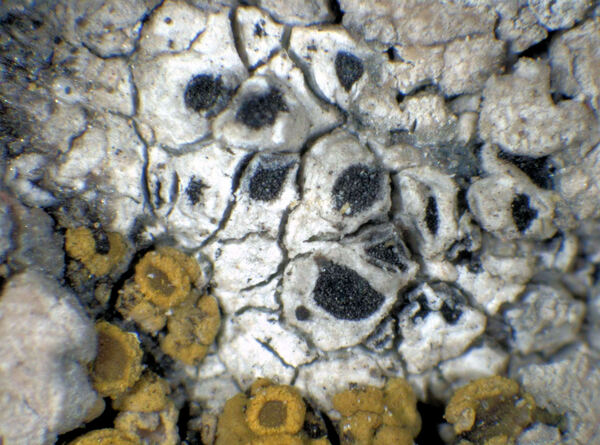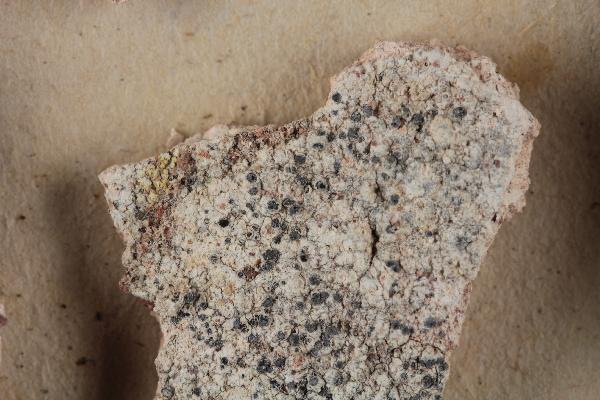Diplotomma murorum (A. Massal.) Coppins
in Hawksworth & al., Lichenologist, 12: 106, 1980. Basionym: Diplotomma alboatrum var. murorum A. Massal. - Ric. Auton. Lich. Crost.: 98, 1952.
Synonyms: Buellia epipolia var. murorum (A. Massal.) Zahlbr.
Description: Thallus crustose, inapparent to more or less continuous and powdery, whitish to pale grey, epruinose, forming small patches on the thalli of Kuettlingeria teicholyta. Medulla white, I-. Apothecia lecideine, black, 0.3-1.2 mm across, subsessile, with a soon convex, heavily white-pruinose disc, a thin, sometimes excluded proper margin, and often a pseudothalline margin in young apothecia. Proper exciple thin, brown in outer part, colourless to pale brown in inner part, of radiating hyphae; epithecium brown; hymenium colourless, K/I+ blue; paraphyses simple, c. 2 μm thick at mid-level, the apical cells up to 3 μm wide; hypothecium brown. Asci 8-spored, clavate to cylindrical-clavate, the apical dome K/I+ dark blue with a pale, conical-pointed apical cushion (axial mass), the wall I-, but the thin outer gel I+ blue, approaching the Bacidia-type. Ascospores 3-septate, brown, ellipsoid, sometimes slightly curved, thick-walled, 20-22 x 7.5-9 μm. Photobiont chlorococcoid. Spot tests: K-, C-, KC-, P-, UV-. Chemistry: without lichen substances.
Growth form: Crustose
Substrata: rocks
Photobiont: green algae other than Trentepohlia
Reproductive strategy: mainly sexual
Most common in areas with a humid-warm climate (e.g. most of Tyrrenian Italy)
paras Kuettlingeria teicholyta
Commonnes-rarity: (info)
Alpine belt: absent
Subalpine belt: absent
Montane belt: absent
Dry submediterranean belt: rather rare
Humid submediterranean belt: rather rare
Padanian area: extremely rare
pH of the substrata:
1 2 3 4 5
Solar irradiation:
1 2 3 4 5
Aridity:
1 2 3 4 5
Eutrophication:
1 2 3 4 5
Poleotolerance:
0 1 2 3
Altitudinal distribution:
1 2 3 4 5 6
Rarity
absent
extremely rare
very rare
rare
rather rare
rather common
common
very common
extremely common
Loading data...
Occurrence data
Predictive map
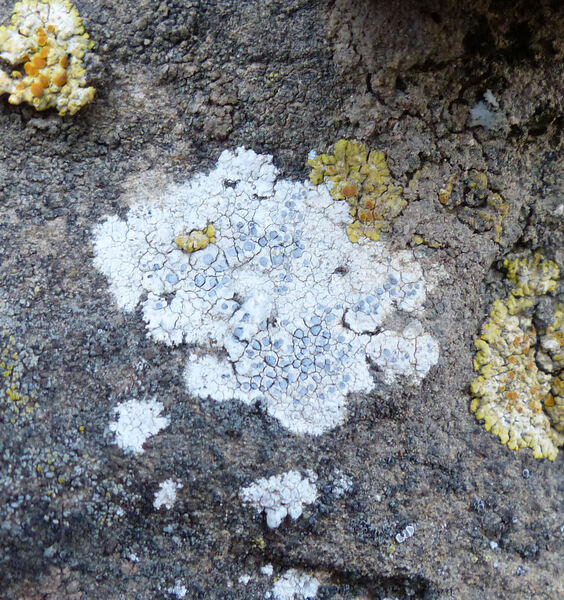
Andrea Moro; Owner: Department of Life Sciences, University of Trieste
Italy, Friuli Venezia Giulia, Trieste, Trieste, Conconello
14/02/2017
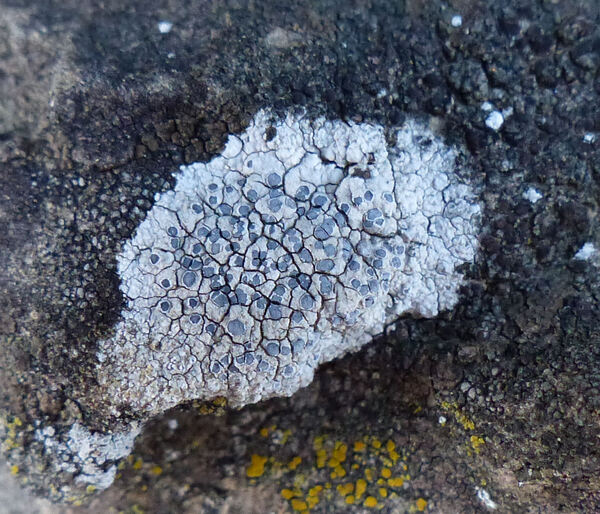
Andrea Moro; Owner: Department of Life Sciences, University of Trieste
Italy, Friuli Venezia Giulia, Trieste, Trieste, Conconello
14/02/2017
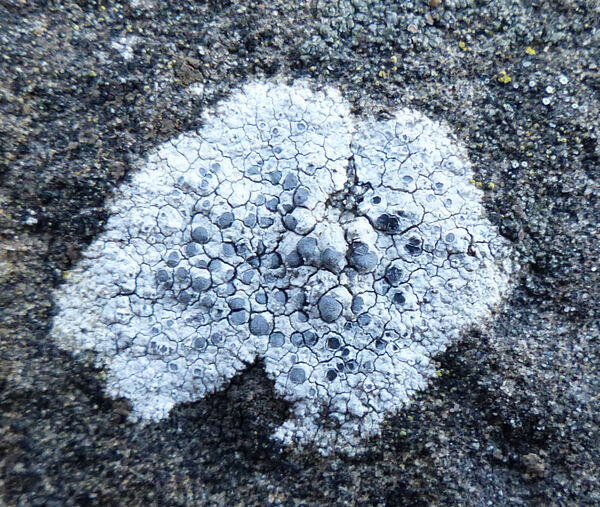
Andrea Moro; Owner: Department of Life Sciences, University of Trieste
Italy, Friuli Venezia Giulia, Trieste, Trieste, Conconello
14/02/2017
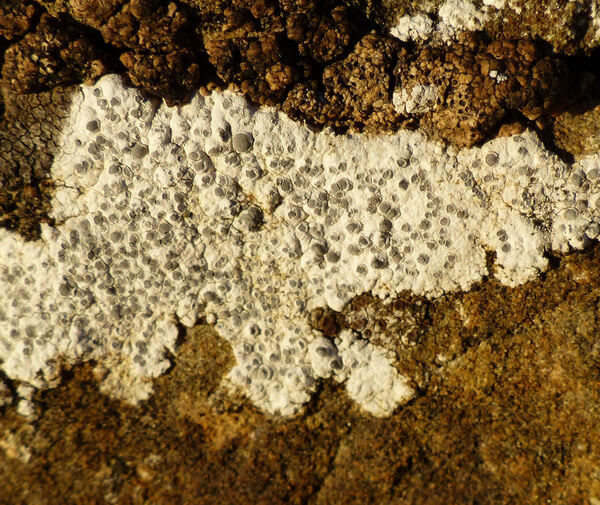
Andrea Moro; Owner: Department of Life Sciences, University of Trieste
Italy, Friuli Venezia Giulia, Trieste, Trieste, Conconello
14/02/2017
Growth form: Crustose
Substrata: rocks
Photobiont: green algae other than Trentepohlia
Reproductive strategy: mainly sexual
Most common in areas with a humid-warm climate (e.g. most of Tyrrenian Italy)
paras Kuettlingeria teicholyta
Commonnes-rarity: (info)
Alpine belt: absent
Subalpine belt: absent
Montane belt: absent
Dry submediterranean belt: rather rare
Humid submediterranean belt: rather rare
Padanian area: extremely rare
pH of the substrata:
| 1 | 2 | 3 | 4 | 5 |
Solar irradiation:
| 1 | 2 | 3 | 4 | 5 |
Aridity:
| 1 | 2 | 3 | 4 | 5 |
Eutrophication:
| 1 | 2 | 3 | 4 | 5 |
Poleotolerance:
| 0 | 1 | 2 | 3 |
Altitudinal distribution:
| 1 | 2 | 3 | 4 | 5 | 6 |
Rarity
absent
extremely rare
very rare
rare
rather rare
rather common
common
very common
extremely common
Loading data...
Occurrence data
Predictive map

Andrea Moro; Owner: Department of Life Sciences, University of Trieste
Italy, Friuli Venezia Giulia, Trieste, Trieste, Conconello
14/02/2017

Andrea Moro; Owner: Department of Life Sciences, University of Trieste
Italy, Friuli Venezia Giulia, Trieste, Trieste, Conconello
14/02/2017

Andrea Moro; Owner: Department of Life Sciences, University of Trieste
Italy, Friuli Venezia Giulia, Trieste, Trieste, Conconello
14/02/2017



